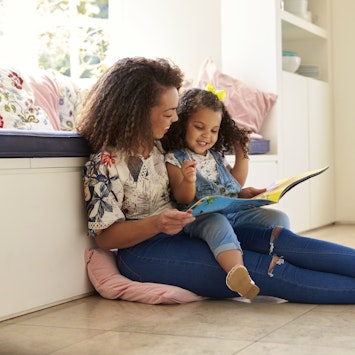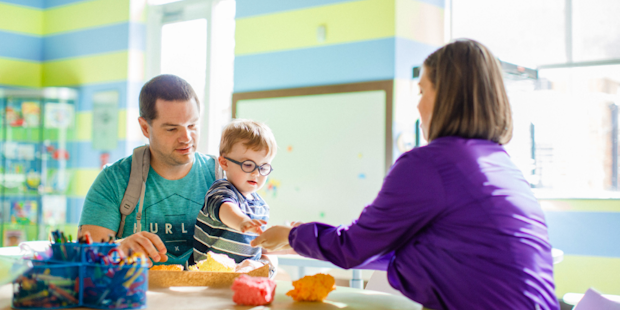More is Caught Than Taught
Discovery Place Kids Huntersville

It’s a lesson shared with parents early on in parenting: kids will emulate what they see presented to them. This “rule”-if we can call it that- goes for behavior, language development, social skills, table manners - even diet, nutrition, fitness and mindfulness.
What a lot of parents don’t realize though is this applies even to how they interact with the world: nature, people… everything. Child development experts call this kind of learning “observational learning”. Early Childhood Educator Kylie Rymanowicz at Michigan State University explains, “The models [of observation] do not have to be people that the child directly interacts with. Children learn from models all around them, on television, in the grocery store, at school and at home.”
As parents, we know that exposing our kids to interesting, diverse, inclusive, and constructive environments of learning is of tremendous value. But, if the science is correct, our children will learn just as much by the behavior we model. Rymanowicz explains that children observe and imitate “prosocial behaviors” through observational learning: “Watching someone cooperate, share, take turns and demonstrate altruistic acts can teach children to show those behaviors too.”
Have you ever observed your kids playing with bubbles? They are lost. Transfixed. Mesmerized. They are curious, enraptured, and entertained. They are most alive in those moments of discovery. And, unless you’ve grown callous to the bottles of spilled bubble juice, you can’t help but be transported with them.
When was the last time you got caught up in something like that for yourself? When we grow up we tend to lose that wonder. But, consider the value of your kids seeing you this way.
One of the greatest gifts we can give our kids is a sense of wonder. The best thing is, most kids already have it - and in spades. The entire world is a learning opportunity for a child. The truth is, it is for us, too; we just have to work a little harder sometimes to get there.
Here are a few simple ways to nurture your sense of wonder and encourage your child’s curiosity:
1. Try something new. New experiences are everywhere not only for children, but also for adults. And the great thing is that new experiences can be simple. So, challenge yourself to try something new - a new recipe for Saturday brunch, a new yoga class, a new app on your phone or tablet, or learn how to fix something in the house that’s broken. Even more important - let your kids see you trying something new and chasing new curiosities of your own; then talk to them about what you’re learning. Exploring an interest demonstrates ongoing learning for your children. It can awaken new interests in them and give them the courage to try something new, as well.
2. Read. Our children will grow up in a world of technology: TV, tablets, smartphones, video games; what they won’t be as readily exposed to is the joy of reading. Join the local library. Most libraries offer story time for children, so couple this with your own perusal. Borrow a stack of new pictures books, but, more importantly, let your kids see you lost in the stacks. Encourage regular reading time at home. Even if it is looking at picture books upside down, time spent reading - and do call it reading - is an important discipline - let them see you doing it.
3. Get outside! There is no greater teacher than Mother Nature. A weekend hike together might find you all talking about the life cycle of plants, dehydration and the competitive spirit - not all at the same time, mind you. The point is, getting outside gives us freedom from doing and time for thinking. Your children are imprinting their brains all day long, don’t you want a say in what is being written? Get outside and show them nature - you’ll be amazed at the questions that rise up not only for your children, but also for you.
4. Visit and explore museums together. There are so many fun, unique, and smart ways you and your children can discover, explore, play, learn, be curious, and wonder together. Expose yourself - and your kids - to the unfathomable intricacy of this world. It helps us remember how much bigger it is than just ourselves. It renews the spirit, quiets the mind, and speaks to the soul. Go and explore.
Parents and caregivers, you will never check off all the to-do’s of parenting. Sometimes the list can see insurmountable, daunting and even dull. It shouldn’t feel that way - at least not all the time.
When was the last time your children saw you in awe? Consider observational learning as another opportunity to teach your children. It is, after all, how they will learn the importance of curiosity; if they see you- parents, grandparents, caregivers, adults - emphasizing and exercising this important skill.
Another special point: This is a no-pressure equation. Figure out what what makes you curious, pack up the kids and go explore. Discuss what you are curious about and ask questions. In effect, you’re showing them how to think freely, inventively and independently.
Consider again: more is caught than taught. Your children will learn more from you and the way you interact with the world than they will learn anywhere else. If your desire is to have children who encounter the world with curiosity and problems with skill, they need to see you doing the same.





